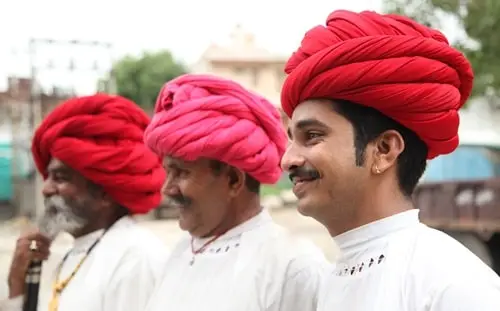The shiny desert and scorching heat come to mind when thinking about Rajasthan. Heavy jewelry with extremely bright and colorful traditional Dress is the pride, social status, and the regional culture of Rajasthan. Here are some of the traditional dresses worn by Rajasthani men and women.
Traditional Dress for Rajasthani Men
1. Dhoti and Pyjama
As Rajasthan is known for its hot and humid temperatures, most Rajasthani men prefer wearing a Dhoti and Pyjamas. The fabric is pure cotton and white. A dhoti is a broad piece of cloth tied around the waist. This garment is then passed over the legs and tucked over the back side of the waist. Pajamas are a unique version of baggy trousers made of pure cotton. Men prefer wearing silk pajamas with matching kurtas on special occasions.
2. Angarkha
Angarkha is a popular traditional frock-style dress worn by Rajasthani men. People in rural areas prefer wearing this dress. It is super comfortable and easy to wear. The extremely long sleeves protect against extensive sunrays. Angarkhas are available in two exclusive versions: extended and Kamari Angarkha. The Long Angarkha reaches the knees, while the latter one is up to the waist. Regular Angarkhas are short with simple patterns on them. Motifs embedded are worn during weddings.
3. Kurta Pyjama
Kurta Pyjama is a comforting dress for local men. It depicts a long, loosely fitted shirt with full sleeves. Kurta ranks among the top comfortable dresses worn in Rajasthan.
4. Bandgala
Bandgala is a traditional coat worn by Rajasthani men during weddings. It is a full-sleeved coat with a tightly closed collar. It is a personal favorite and well-preferred dress worn by every Rajasthani male.
5. Patka
Patka is a traditional dress with shimmering Zari decoration on the lower side and red cloth on the upper end. This traditional Dress is worn typically to keep weapons for safety while traveling. In modern times, men use it to keep Kattar and swords too.
6. Achkan
Achkan is a high-end tunic dress with long sleeves worn by Rajasthani men. This traditional attire is embedded with stylish buttons on the whole front. It is similar to a kurta but has a side opening stitched with strings. Achakan is made of rich colors and gives an ethnic look.
7. Pagdi

Padgis are a symbol of pride and honor in Rajasthan. They are worn with an angarka or kurta. Pagdis (turban) are 80 feet long and 8 metres wide. Rich people wear vivid-coloured pagdis, while the poor wear single-coloured ones.
Traditional Dress worn by Rajasthani women
1. Kachli
Kachli is similar to a choli or a blouse. It is longer when compared to a blouse. The setup of the kachli involves the upper end being tucked on the side of the chest. Kachli is paired with a long flared skirt or ghagra. It gives a beautiful and royal look when worn with the right combination.
2. Ghagras
Long, flowing skirts called Ghagras are the signature dress of every Rajasthani Woman. The skirt has a geometric design with a mirror and zari work running all over it. In addition, it comes in diverse colors. Renowned garment prints like Mothra, Laharia, Chunari, Bandhej, and Tie-and-Dye are famous in different cities in Rajasthan.
3. Odni
Odni or dupatta is a 3-metre and 2-metre-long piece of fabric worn over the ghagra-choli. It is lightweight and embedded with beadwork, sequin, coral shells, embroidery, and mirrorwork. Odni is worn as a headgear up face and a way to pay respects to elders in the family,
Footwear and Jewellery worn by Rajasthani men and women
Mojadi are shoes made of animal leather with embroidery of brocade or velvet clothing. It is designed to ensure proper ventilation for the feet. These mojadis are suitable during deserts as well.
Necklaces and bangles enhance women’s beauty. Women from tribal communities wear silver, alloy, or brass jewelry. The wealthy prefer Jadau sets, Rani Haar, Borla, Payal, Bichua, Rakhdi, Surlia, Nathani, etc.
Conclusion
Traditional dresses represent the state’s culture. They reflect simplicity and add a glorious significance to the royal land. The use of different color, embellishments and fabric further distinguishes the social status and regional variations.

